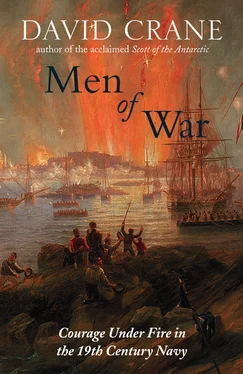Charles was thirty-eight on his marriage, and still only forty-one in 1793 when war broke out with France, but to his deep frustration a Tory government could find no active use for him in the years ahead. The seven years between 1796 and 1803 were spent instead in command of the garrison on Jersey, and by the time his friends came into power, age, ill-health and a growing melancholy had reduced him to a kind of English version of Tolstoy’s old Prince Bolkonski, brooding in his library over his maps and despatches as Bonaparte’s armies redrew the boundaries of Europe.
It is hard to imagine what solace a world-weary free-thinker can have found in Parnell Hastings – ‘a great bore’ is the only surviving judgement on her – but the one thing they shared was a deep love of their two surviving children. It would seem that their eldest, Charles, was always closer to his mother than to his father, but if there were times when the old general thought a good dose of peppers in the boy’s porridge would cure him of his ‘milk-sop’ tendencies, there were no such fears over his younger and favourite lad, Frank, born in 1794 and destined from an early age for a career in the navy.
With his father’s royal and military connections – Lord Rawdon was Commander-in Chief for Scotland and Sir John Moore a close friend – it seems odd that Frank did not follow him into the army, and odder still when one remembers the grim reality of naval life in 1805. In May 1803 the brief and bogus Peace of Amiens had come to its predictable end, and for the two years since Britain’s weary and overstretched navy had struggled from the Mediterranean narrows to the North Sea to contain the threat of the French and Spanish fleets while the country steeled itself for invasion.
It is only in retrospect that 1805 seems the year to go to sea, because with Napoleon abandoning his invasion plans, and the allied fleets holing up in Cádiz after their West Indies flirtation, the only certain prospect facing Frank as his father took him down to Plymouth was the ‘long, tiresome and harassing blockade’ work that had become the navy’s stock in trade. ‘I think it incumbent upon me to announce to you the disposal of my boy,’ a grateful Charles Hastings wrote to Warren Hastings on 11 June 1805, a month after entering Frank as a Volunteer First Class under the command of one of Nelson’s most bilious, courageous and uxorious captains, the solidly Whig Thomas Fremantle, ‘whom you were so kind as to patronize by writing to Lord St Vincent. He is at present with the Channel fleet on board the Neptune of 98 guns commanded by my friend Captain Fremantle. We have heard from him since, and he is so delighted with his profession that he declares nothing shall ever tempt him to quit it – I took him down to Plymouth myself.’
It would be hard to exaggerate how alien and hermetic a world it was that closed around the young Hastings when his father deposited him at Plymouth. As a small child growing up on Jersey he would have been familiar enough with garrison life, but nothing could have prepared him for the overpowering strangeness of a great sea-port during wartime, its utter self-sufficiency and concentration of purpose, its remoteness from the normal rhythms of national life, its distinctive mix of chaos and order, its forest of masts and myriad ships’ boats, or the sheer, outlandish oddity of its inhabitants. ‘The English keep the secrets of their navy close guarded,’ the young Robert Southey, masquerading in print as the travelling Spanish nobleman Don Manuel Alvarez Espriella, wrote two years later of his attempt to penetrate the sealed-off worlds of Britain’s historic ports. ‘The streets in Plymouth are swarming with sailors. This extraordinary race of men hold the soldier in utter contempt, which with their characteristic force, they express by this scale of comparison, – Mess-mate before ship-mate, ship-mate before a stranger, a stranger before a dog, and a dog before a soldier.’
At the outbreak of the Napoleonic War the Royal Navy was quite simply the largest and most complex industrialised organisation in the world, and it was in the great south coast ports of Plymouth or Portsmouth that this took on its most overwhelming physical expression. ‘A self-contained walled-town,’ wrote Caroline Alexander in her magical evocation of the dockyards that serviced the world’s greatest fleet – eighty-eight ships of the line in commission the year Frank joined, thirteen ‘Fifties’, 125 frigates, ninety-two sloops, eighteen bombs, forty gunbrigs, six gunboats, eighty-two cutters and schooners and forty-one armed ships,
the great yard encompassed every activity required to send ships to sea … There were offices and storehouses, and neat brick houses … as well as the massive infrastructure required to produce a ship. In the Rope-house all cordage was spun, from light line to massive anchor cable, in lengths of more than a thousand feet, some so thick that eighty men were required to handle them … Timber balks and spires of wood lay submerged in the Main Pond, seasoning until called to use. In the blacksmith’s shop were wrought ninety hundred-weight anchors in furnaces that put visitors in mind of ‘the forge of Vulcan.’ And on the slips, or docked along the waterfront, were the 180-foot hulls of men-of-war, the great battle-wounded ships brought for recovery, or the skeletons of new craft, their hulking, cavernous frames suggesting monstrous sea animals from a vanished, fearsome age.
Along with all this industrial might came the people, the contractors and tradesmen, the wives and prostitutes, the shopkeepers and clerks, and the thousands of workers who kept the fleets at sea. ‘I could not think what world I was in,’ another boy recalled his introduction to this alien culture, ‘whether among spirits or devils. All seemed strange; different language and strange expressions of tongue, that I thought myself always asleep or in a dream, and never properly awake.’
If it was an alien world, though, with its own language and languages – England, Ireland, Canada, America, the Baltic, Spain, Portugal, Puerto Rico, Martinique, Sardinia, Venice, they were all represented in Neptune – its own customs, and traditions, its own time-keeping, arcane ways of business and overlapping hierarchies, it was a world the young Hastings took to as if he had known no other. ‘Whilst on board with him (although only eleven years old last month),’ Sir Charles proudly told Warren Hastings, ‘he offered to go up the masthead without going through the Lubbers’ hole which however Capt Fremantle would not permit as I could not have borne seeing him make the attempt – I have no doubt that he will do very well if his education is not neglected but as there is a Schoolmaster on board I entertain great hopes of him making a proficiency.’
There were thirty-four boys in all entered in Neptune ’s muster book – the youngest nine years old (there was a four-year-old girl in Victory , born in HMS Ardent in the middle of the Battle of Copenhagen) – though only a handful rated ‘Volunteer First Class’ who were destined to be officers. There was still such a wide divergence of practice from ship to ship that it is impossible to generalise about these boys’ duties, but in a world of interest and patronage, the naturally symbiotic relationship of captain and volunteer was a well-connected boy like Hastings’s best guarantee of the training his father had wanted for him. ‘My Dear General,’ – that ‘most mischievous political quack … Mr Pitt’ was still alive and the general as yet without his baronetcy – Captain Fremantle was soon writing to Frank’s father, conscientiously carrying out his side of the bargain: ‘… of your boy I can say nothing but what ought to make you and Mrs Hastings very happy, he is very mild and tractable, attentive to his books & dashing when with the youngsters of his own age. I declare I have had no occasion to hint even anything to him, as he is so perfectly well behaved.’
Читать дальше











